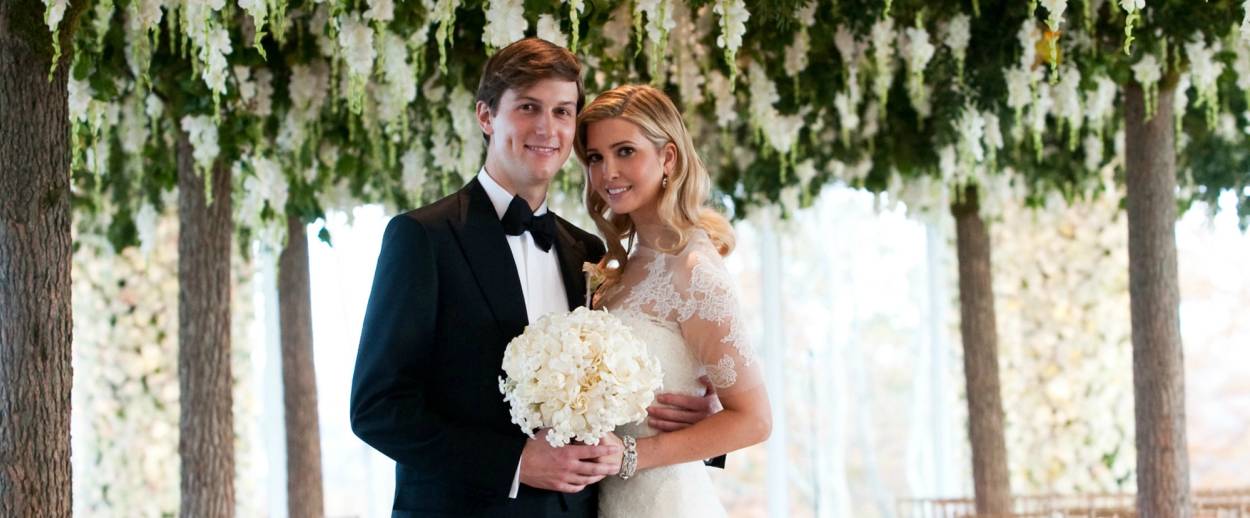Ivanka Trump and Double Standards for Jewish Converts
Jewish converts are often unfairly scrutinized and face intense pressure to obey Orthodox observances. But they should be treated with open arms, just like Ivanka Trump.




One theme of Donald Trump’s meteoric political rise has been how fame and fortune—and his enthrallingly obtuse personality—has exempted him from the rules the rest of us live by. Like nobody else in the competition for the White House, Trump gets to have his cake and eat it too, and it tastes good every time—to him.
At AIPAC, Trump diverted attention from his controversial appearance there by acting the part of a collected, telepromter-reading, ultra-hawkish-on-Israel politician, including his sharing with the crowd the fact that his daughter would soon have a “beautiful Jewish baby.” Altogether, his flip-floppy, “believe me” performances have made me realize that Trump’s double standards extend beyond himself, and to the rest of his family, particularly his daughter, Ivanka. Somehow, she seems to have been exempted from the invasive scrutiny, questioning, and disrespectful treatment so often aimed at converts to Judaism like her.
Ivanka converted in 2009 before her marriage to Jared Kushner. She rarely discusses her conversion or her Judaism. There is the occasional glimpse on her Instagram feed: Shabbat dinner preparations or mishloach manot baskets and costumes for Purim. She is an involved Jew, but not necessarily one that fits the Orthodox stereotype, posting about non-Kosher food and not-tznius outfits on social media.
Now, let me be clear: there’s nothing wrong with any of this. No one has the right to judge Ivanka’s Jewishness or religiosity as a convert, just as no one has the right to judge—or question, or pry into—mine. Yet it is hard for me to believe anyone in her well-heeled congregation is giving her a hard time about this. Why, then, am I and the majority of converts I know, constantly the subject of such scrutiny? For any other female convert, emulating the types of posts Ivanka puts on Instagram would be unthinkable.
While conversion revocations aren’t common in the United States, there is intense communal pressure for converts to stay on the straight and narrow because of a perception that they often “fall off the derech,” or stop being observant. And the very fact that some conversions have been revoked puts intense pressure on converts, especially women (for whom the issue of modest dress is much more germane and whose Judaism their children’s identity hinge on). Who will see it? Will they “inform” on you? Will the impression of laxity give them cause to stop eating at your home, or having their children avoid yours?
As an active member of the conversion community I’ve heard enough horror stories to fill a book: shadchans (matchmakers) refusing to work with converts, probing questions at a Shabbos table with strangers, conversions overseen by rabbis who want to take a walk around the block (if you catch my drift) with their shiksa conversion candidate before she becomes officially Jewish. And throughout my own conversion process—and long after—close friends, family, and strangers would tell me: But you’re not really Jewish.
Then there are the horror stories of conversions revoked or questioned for “offenses” like wearing pants or not keeping Shabbat after the conversion. The Israeli Rabbinate—a kind of College of Cardinals for global Jewry—has lent credence to this absurdity, sending a chill through converts and conversion candidates in the United States.
All of which makes much of the Jewish community’s response to Ivanka Trump’s Orthodox conversion—or better yet, the apparent lack thereof— so astounding. Somehow Ivanka has managed to obtain what no other Orthodox convert I know has: acceptance from the Jewish community while at the same time flouting convention that the rest of us could hardly get away with. Apparently having wealth, fame and power buys you a lifetime supply of indulgences. I don’t think the Jewish community has begun to grasp how this makes us look.
To be clear, Ivanka should be treated this way—welcomed with open arms and never having her commitment to Judaism questioned or tested by nudniks. But the rest of us commoners should also be afforded the same consideration. In fact, It’s Jewish law. In Exodus 23:9, God makes quite clear how he feels about how the convert—a stranger within the Jewish community—should be treated. “Do not oppress a stranger; you know how it feels to be a stranger, because you were strangers in Egypt.” And yet, infuriatingly, this clear Biblical prohibition about abusing the convert, the ger, is one of the most ignored parts of Jewish law. Plainly, it states: treat converts with acceptance. And not just the famous, glamorous ones.
The Torah’s commandment to accept the stranger is specifically worded as a warning against hypocrisy. Clearly, that’s a lesson we still haven’t learned.
Bethany Mandel is a freelance writer and stay-at-home mother in New Jersey. She writes on politics, culture, and Jewish issues from a politically conservative perspective. You can follow her on Twitter @bethanyshondark.